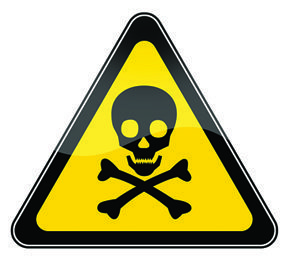By Evie Breedlove-Mangapora, ARNP
& Deborah J. Post, ARNP
 What are Toxins?
What are Toxins?
A toxin is something that interferes with normal working of the human body in a negative way. Some toxins, are waste products from the normal activity of cells. (Ie uric acid that accumulates or lingers causes gout). Another type are Xenobiotics that are human-made toxins that we knowingly or unknowingly become exposed to. When these toxins build up in our body more quickly than they can be eliminated, they are linked to hormone disruption, cell damage and tumors.
Human-made toxins:
• Pesticides and herbicides sprayed on food
• Food packaging (linings of canned foods, polycarbonate plastic, thermal coating on cash register receipts
• Dyes or chemicals added to prescription or OTC drugs and medications
• Synthetic clothing
• Carpets
• House paints
• Building Materials
• Mattresses
• Vinyl Shower Curtains
• Air fresheners or fragrances
• Cleaning Products
• Cosmetics
• Body Care Products and Shampoo
• Emissions from cars and trucks
• “New Car Smell” (off-gassing from PVC)
• Water
Feel like you cannot escape it?
You are right we CANNOT remove all of the toxins!
But we CAN take steps to reduce exposure and total toxic burden placed upon our bodies.
We want to find a balance between reducing our exposure without making ourselves crazy with anxiety.
Endocrine Disruptors:
Endocrine disruptors are chemicals that may interfere with the body’s hormones ( communication system) that regulate all body processes from conception through old age. Major organs that secrete hormones include: ovaries, testes, pituitary gland, thyroid gland, adrenal gland and pancreas. Research implicates endocrine disruptors in many health problems including BUT NOT LIMITED TO:
• Reproductive disorders
• Obesity and diabetes
• Neurological disorders
• Breast cancer
• Endometriosis
• Immune disorders
• Thyroid disorders
• Osteoporosis
How to Reduce our Toxic
Load and Avoid Endocrine Disrupters:
1. Avoid Plastics. Plastics contain endocrine disrupters that leach into food and water particularly when heated. Use glass when possible. Don’t drink water bottled in plastic.
2. Avoid Canned Food-Eat Fresh or Frozen. Food and drink that come in cans could contain estrogen-like chemical BPA. The EWG found that BPA is used in lids of many glass jars, aerosol cans for whipped topping and nonstick spray, bottles and tins of cooking oil and aluminum beverage cans, metal coffee cans and even beer kegs.
3. Eat Whole Foods. Avoid processed and refined foods as they contain food additives and can overwhelm your colon and liver so that circulating hormones are not eliminated efficiently.
4. Buy Organic when possible (see www. ewg.org for the Clean 15 & Dirty Dozen). Buying organic can limit intake of endocrine disrupters in and on fruits and veggies.
5. Buy pasture-raised animal products. Connect with a local farmer. The animal should eat a natural, grass fed, pesticide and GMO free diet. Local farm methods are often more transparent than big industry.
6. Eat detox veggies. Eat cruciferous veggies such as broccoli and cabbage that contain flavones and indoles that help deflect excess estrogens. Avoid high estrogen foods.
7. Avoid Soy. Soy is a source of phytoestrogen and frequent exposure is causing it to be an endocrine disruptor. (Fermented organic soy has less detrimental).
8. Use Chemical-free cosmetics, body care. The list of hormone-disrupting chemicals in cosmetics and skin care is long, so check out the list of ingredients. If you see “fragrance” or “perfume” AVOID IT! (see ewg.org-Skin Deep Cosmetic Safety database to see how your favorite products stack up ) They have 80,000 products rated for you for free.
9. Use Safe Household Cleansers. Avoid phthalates and other hormone disruptors. Buy environmentally safe laundry detergents and dishwashing liquid. Consider regular Castile soap and water
10. Filter your drinking water and shower water [YUCK . . .water is often contaminated with antidepressants, hormones, heart medications, prescription and OTC drugs, chlorine, carcinogens from industrial and agricultural waste. (see ewg.org for buying guide )]
11. Do a seasonal cleanse to support the body’s detoxification system (avoid alcohol, dairy, gluten or other known food sensitivities for 7days or more)
It is up to us to do our best to avoid toxins and hormone disrupting chemicals.
How we can help:
How we each CLEAR TOXIC SUBSTANCES is unique and primarily it is thru LIFESTYLE CHANGES AND NUTRITIONAL SUPPORT. This can be individualized and OPTIMIZED with counseling if you are having symptoms of fatigue, insomnia, brain fog, weight gain, anxiety and other signs of system overload. We want to help. CALL US and discuss how we can be of service and GET YOUR HEALTH BACK ON TRACK!
Deborah Post ARNP and Purple Spoon Culinary present:
25151 Chamber of Commerce Drive, Bonita Springs FL 34135
Come enjoy a live cooking presentation of healthy, helpful, locally sourced food, prepared in front of you while learning about how best to keep you and your family safe as possible from the devastating effects of cancer.
Come learn from Deborah J Post ARNP and Chef Kristina San Filippo how to create a healthy home “inside and out” and the education on how to do this safely as this is crucial to the health of our families and community.
Come enjoy a three course dinner including wine and sustainably raised, locally sourced food with the lecture for $58.
Seating is limited so call now and reserve your seat for this exciting event.
RSVP: Purple Spoon Chef Kristina 239-908-3842
purplespoonculinary@yahoo.com
https://www.facebook.com/chefkristina/









